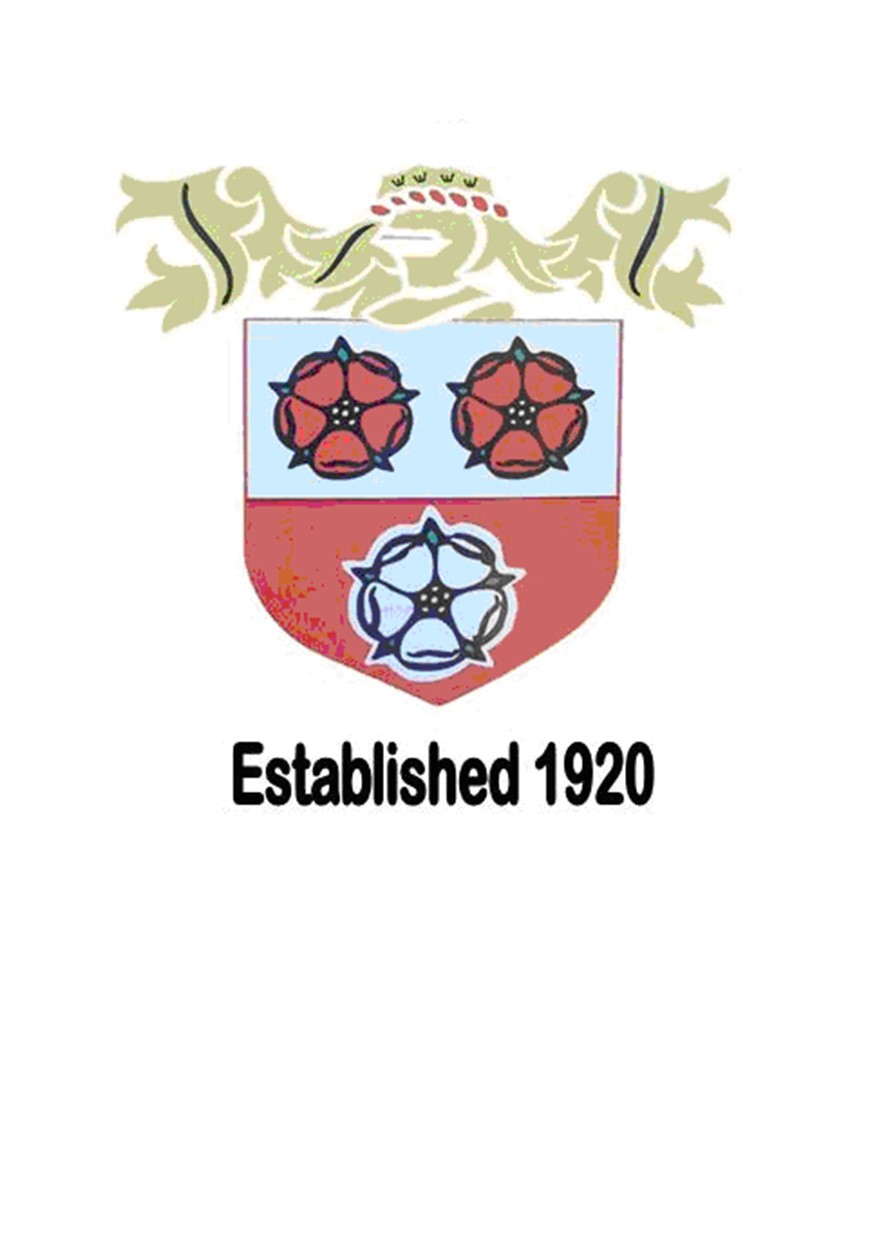In March 1930 a week’s engagement was carried out at the PALACE THEATRE (bombed in 1940) when the Band were part of a play called “BARBED WIRE”, in which the members were billed as a full ex-Guards Band with bearskins and scarlet tunics. The period of the play was the 1914-18 war.
Between the first and second houses the Band played on the veranda of the Theatre to draw the crowds, which they did so successfully that the Police stopped this performance on the Saturday night because it caused a traffic jam. Unfortunately the public were under the impression that it was a full Guards Band playing, and the amusing part about this was that very few of the members were old enough to have become service men, let alone be ex-service bandsmen, as most of them were boys of no more than 14 to 18 years of age.
Gillingham in Dorset was the venue of the first contest undertaken by the Band since the break-away from the Scouts, and they won 1st Prize in “B” section of the Wessex Association Summer Contest in 1930.
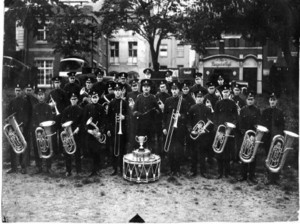
In 1933 they won both the Winter and Summer Contests, competing in the “A” section, and from then on the Band has had many successes in the Contest field.
Many unique engagements have been carried out by the Band and one of these was at the Stadium in about 1932 when, in the days when most people did not even have radios, the results of a General Election were broadcast by loud speakers. This engagement commenced at 10pm and finished at about 3am, the Band playing between announcements. It was a very cold night, and large coke braziers were kept burning to keep the people warm.
On another occasion the Band turned out at 5am to meet the German liner “Columbus”, bringing over German supporters for an International Football match at Wembley. The Albion Band played on the quayside alternately with the ship’s band playing on board and this was about the first time the Nazi salute had been seen at first hand. The “Columbus” was one of the first ships to be scuttled during the war.
With most of the members at this time still in the “youth” stage, the Band very often took part in concerts in the winter and fetes in the summer in aid of Youth Organisations. One particular concert was held at the Coliseum in conjunction with the Northam Boys Club, which was now becoming very active. This was very successful, as was the ensuing fete held the next summer at The Wilderness, West End – then a large country house with extensive grounds, and now a housing estate.
During the depression of the 1930s the Mayor of the Town organised a scheme whereby the unemployed could work in the Town’s improvements and be paid in kind, such as doing a day’s work (usually digging). At the end of the shift, they would be given a voucher to go to various shops or stores and purchase say, a pair of boots or trousers, or other clothing for themselves or their families. To pay for this, a fund was started and various functions arranged, and as usual the Band came to its support and held a concert in the old Grand Theatre. A large sum of money was raised at this concert to benefit the “Mayor’s Scheme” as it was called.
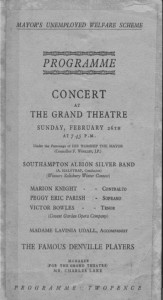
At this stage the Town also was in dire need of money, so one of the first economies made was to cut Band performances. These were dispensed with, but so that the public should not be deprived of this pleasure, the Albion volunteered to perform free of charge on the Common. This was a great success and the Band gave a concert to a large crowd. Subsequently, numerous requests were made for repeat performance and these were carried out with the same success.
The Band had now become members of the Football Supporters Club, and every year this club held its Annual General Meeting on board the then world’s largest liner, the White Star Liner “Majestic”. The Band and Supporters Club formed up at the Dock gate and marched from there to the ship. After a short programme of music on board, the meeting used to start and the Band members took this opportunity to tour the ship.
By now the band were fitted out with royal blue uniforms, the buttons and facings in Scots Guards style. These uniforms stayed with the Band until about 1950.
In September, 1933, the Band had its first National success at the Crystal Palace, gaining 3rd prize in a section with 30 bands. This was under the baton of Mr. A.H. Muddiman (Mr. Halestrap having left and actively coaching Hollybrook Homes Boys Band). 1933 was a very good year for the Band, for besides the Crystal Palace success, they won the British Bandsman Challenge Cup, the Boosey Challenge Shield and the Championship of Wessex.
The ensuing years continued to bring success in the Contest field, and now the Band was a force locally to be reckoned with. Three awards were presented at Amesbury in 1935 and the deportment prize was won. A medal to Mr. E. Byrne (bass trombone) as the smartest trombone player on parade was also presented (25 bands taking part). A further three medals were won by soloists R. Hood, Euphonium; N. LeRay, cornet; and J. Allen tenor horn.
There were six prizes won by the Band at Wessex association contests in the years 1934-5, culminating with the Deep Harmony Challenge Cup, British Bandsman Challenge Cup, and the Downside Trophy (Championship of Wessex) together with three medals (L.Burgess – Euphonium, H. Mathieson – Tenor Horn and N. LeRay – Cornet) at the Coliseum, Southampton, in January 1936.
By now the number of medals won by soloists in the Band was 35.
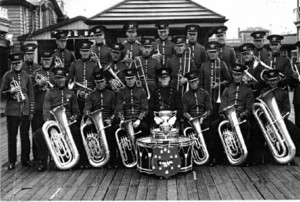
Mr. J. Williamson had become conductor in 1933. He was a very fine gentleman and a great musician, having been a solo cornet player in the famous “Besses of the Barn Band” and later the principal trumpet in a World famous opera company.
During the period in which Mr. Williamson was a conductor, the contesting preparations were taken very seriously, often rehearsing five nights every week and Sunday mornings for two or three hours. These particular practices were held in the garden of the late Alderman A.E. Udall, the president of the Band. On another occasion the members put in over six hours of patient practice on a farm at Cadnam, after which the Band were entertained to tea in the huge flagstoned farm kitchen. We thought that the fruit cake was the largest ever made! After that all-day session, it was rehearsals every night of the week and a final practice during a stop on the way on the Saturday.
In 1935 came the Silver jubilee Celebrations of King George V and Queen Mary, and the weather was ideal for the occasion. Apart from local functions, the Band were engaged at Eling, where there was a very large Church Parade on the Sunday and a children’s party on Monday (a Bank Holiday). On the children’s day, there was a long march from one end of Totton to Eling Recreation ground. This was during a heat-wave, and the hot sun had melted the tar on the roads, causing our feet to sink in and sticking the bottoms of our trousers to our shoes. After the parade, the children had tea and games and then the Band played for dancing , surrounded by children sucking oranges.
On Wednesday it was Southampton Schools turn to parade through the town, forming up at the Civic Centre, and marching to the old Rest Camp at the top end of the Common. All this was carried out in heavy tight fitting uniforms, buttoned right up to the neck, and wearing a heavy cap with a brass bound peak.
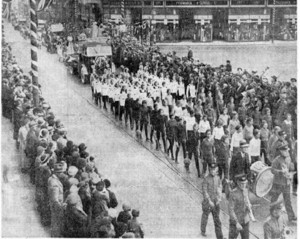
Two years later, all this was repeated for the Coronation of King George VI and Queen Elizabeth, but this time the weather was just the opposite and the celebrations were carried out at times in rainy weather.
At the time of the Spanish Civil War, a large number of children were evacuated from the Basque area and were encamped near Chandlers Ford, whereupon the Albion members volunteered to entertain them on a Sunday evening. After the performance, which was very much appreciated, the evacuees tried to beg cigarettes from the members – the majority of the beggars not over the age of twelve years.
The Old Contemptibles and the British Legion always engaged the Band for their parades, very often heading the local Hampshire Territorial units in impressive Armistice Remembrance services at S. Mary’s Church and at the Cenotaph, and when the Festival of Remembrance was started, it was the Albion Band that supplied the music. This was at the old Coliseum and it was always a full house with tickets in great demand. It must be noted that the British Legion did not have their own Band as they have now.
